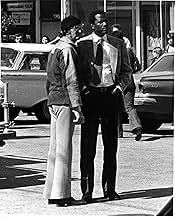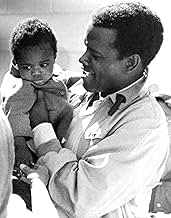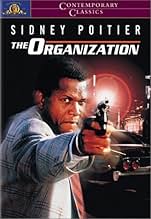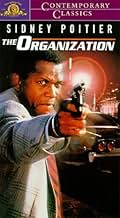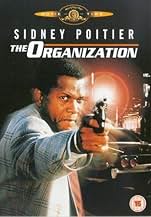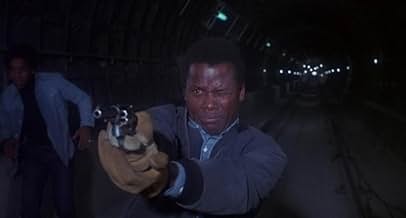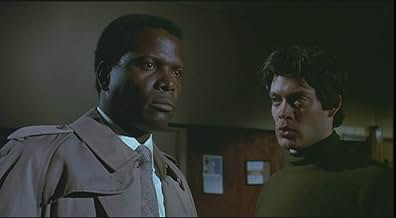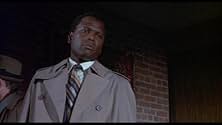NOTE IMDb
6,0/10
2,4 k
MA NOTE
Ajouter une intrigue dans votre langueIn San Francisco, Police Lieutenant Virgil Tibbs helps a group of idealistic vigilantes expose a drug ring controlled by powerful businessmen.In San Francisco, Police Lieutenant Virgil Tibbs helps a group of idealistic vigilantes expose a drug ring controlled by powerful businessmen.In San Francisco, Police Lieutenant Virgil Tibbs helps a group of idealistic vigilantes expose a drug ring controlled by powerful businessmen.
- Réalisation
- Scénario
- Casting principal
- Récompenses
- 1 nomination au total
Daniel J. Travanti
- Sgt. Chassman
- (as Dan Travanty)
Billy Green Bush
- Dave Thomas
- (as Billy 'Green' Bush)
Avis à la une
Perhaps the least-known Poitier work, certainly of the period; at date of writing only nine IMDb members had voted on this film. This is just over 1% of the votes attained by it's initial prequel, the superb "In The Heat of the Night". Between the two is the awful-yet-lovable "They Call Me MISTER Tibbs!" which took the Virgil Tibbs franchise on a downward slope.
Those that do get to see this movie on it's rare t.v. rescreenings and decide to give it a go after the disappointing "Tibbs" will be justly rewarded. Essentially, the production team is the same as the previous film, though Gil Melle provides a jazz-orientated score instead of Quincy Jone's adequate but inappropriate themes. The domesticity is also played down, with Alan R.Trustman absent as co-writer and James R. Webb taking full control of the screenplay. Most importantly, though, is Don Medford as the well above average director. Apart from a rather crude edit where a car accident occurs in the second half of the picture, the scenes are melded together seamlessly and flow together exceptionally well.
Poitier reprises the role of Tibbs, an arrogant, aloof, bad-tempered, authoritarian, bigoted Lieutenant. As a result, this is probably the most appealing of all Sidney's characters, and he slips back into the role effortlessly. With no star names to support him, such as Rod Steiger or Martin Landau (though Raul Julia did become a star later in life), Sidney stands way above his peers. His ability to project a bad atmosphere every time he walks into a room is flawless. This time he is not let down by the plot, either, which sees Tibbs caught between the Police Department and a vigilante gang that seeks to expose a wide net of heroin dealers. The plot takes on many shifts in loyalty and focus, keeping the attention, while a chase through underground tunnels lends the requisite chase an extra air of tension. The racial motif is again absent, though a rival black cop played by Bernie Hamilton gives off a frisson of resentment.
While predictably not of the calibre of "In Heat of the Night", The Organization stands as the greatest of Sidney's seventies vehicles.
Post-Script, March 2016: Over 16 years since I wrote this review (where does the time go?) I realise that I was too soft on what is quite a shaky film. Continuity and editing are not great, and the tone is frequently dirge-like. It's OKAY, but the concluding line that it's the best of Sidney's 70s movies was clearly written by a man who hadn't then seen The Wilby Conspiracy or Brother John. It's what's known as a "take a chance" point of view, and in this case it was wide of the mark.
Those that do get to see this movie on it's rare t.v. rescreenings and decide to give it a go after the disappointing "Tibbs" will be justly rewarded. Essentially, the production team is the same as the previous film, though Gil Melle provides a jazz-orientated score instead of Quincy Jone's adequate but inappropriate themes. The domesticity is also played down, with Alan R.Trustman absent as co-writer and James R. Webb taking full control of the screenplay. Most importantly, though, is Don Medford as the well above average director. Apart from a rather crude edit where a car accident occurs in the second half of the picture, the scenes are melded together seamlessly and flow together exceptionally well.
Poitier reprises the role of Tibbs, an arrogant, aloof, bad-tempered, authoritarian, bigoted Lieutenant. As a result, this is probably the most appealing of all Sidney's characters, and he slips back into the role effortlessly. With no star names to support him, such as Rod Steiger or Martin Landau (though Raul Julia did become a star later in life), Sidney stands way above his peers. His ability to project a bad atmosphere every time he walks into a room is flawless. This time he is not let down by the plot, either, which sees Tibbs caught between the Police Department and a vigilante gang that seeks to expose a wide net of heroin dealers. The plot takes on many shifts in loyalty and focus, keeping the attention, while a chase through underground tunnels lends the requisite chase an extra air of tension. The racial motif is again absent, though a rival black cop played by Bernie Hamilton gives off a frisson of resentment.
While predictably not of the calibre of "In Heat of the Night", The Organization stands as the greatest of Sidney's seventies vehicles.
Post-Script, March 2016: Over 16 years since I wrote this review (where does the time go?) I realise that I was too soft on what is quite a shaky film. Continuity and editing are not great, and the tone is frequently dirge-like. It's OKAY, but the concluding line that it's the best of Sidney's 70s movies was clearly written by a man who hadn't then seen The Wilby Conspiracy or Brother John. It's what's known as a "take a chance" point of view, and in this case it was wide of the mark.
Part three of the Mister Tibbs detective chapters. Sidney Poitier in another who-dunnit, this time in san francisco. which was also the setting for his "Guess Who's Coming to Dinner" ! After a huge heroin robbery, Tibbs is brought in to figure out what's going on. Graham Jarvis is the employee "Martin". he was awesome in New Leaf and What's Up Doc ? Max Gail (Barney Miller) is in here as Rudy. keep an eye out for Daniel Travanti from "Hill Street Blues." and from The Rookies, Gerald O'Loughlin. those actors will be in all kinds of cop shows. Tibbs isn't sure who to trust, so he starts keeping secrets from his own boss, and from Narcotics, when they get involved. of course, that makes it look like HE was the guilty party. it's all pretty well done. quite rare, that a third chapter could be so good. Directed by Don Medford. he did mostly television after this one. Not bad.
Sydney reprises his Mr. Tibbs moniker in a nicely paced crime drama that has some well orchestrated action sequences, especially the one at the onset of the film. Those first 10 minutes or so reminded me of the heist scene in "Rififi" (1955), in that this scene too was captured with no dialog, letting the viewer see for himself how the action plan was set into motion.
Some reviewers "dissed" the 70's sound track and street jargon, but what do you expect? It's a period piece, a 70's action film and by definition will employ those contemporary motifs. To me, it's both refreshing and amusing to be thrust back into the cultural modes of yesteryear.
The plot line may have had some small weaknesses to it and some of the actors were no Academy Award nominee hopefuls, but the thrust of the film keeps you attentive and anticipatory. Also, it was nice to see Raul Julia, Demond Wilson and Ron O'Neal in one of their earlier films. Sydney, as usual, shines in his rendition of the Tibbs detective. But the plot twists toward the end where Mr. Tibbs puts the pieces together and gets ready to see justice served... Well, see for yourself in this brutally realistic conclusion.
Some reviewers "dissed" the 70's sound track and street jargon, but what do you expect? It's a period piece, a 70's action film and by definition will employ those contemporary motifs. To me, it's both refreshing and amusing to be thrust back into the cultural modes of yesteryear.
The plot line may have had some small weaknesses to it and some of the actors were no Academy Award nominee hopefuls, but the thrust of the film keeps you attentive and anticipatory. Also, it was nice to see Raul Julia, Demond Wilson and Ron O'Neal in one of their earlier films. Sydney, as usual, shines in his rendition of the Tibbs detective. But the plot twists toward the end where Mr. Tibbs puts the pieces together and gets ready to see justice served... Well, see for yourself in this brutally realistic conclusion.
Six people break into the Century Furniture factory. San Francisco Police Lieutenant Virgil Tibbs (Sidney Poitier) is called in to investigate a dead executive. Nothing else is reported missing. The group of vastly different people reveals themselves to the trustworthy Tibbs. They had stolen a large stash of heroin from the factory in an attempt to overthrow a secret drug ring. They had kidnapped the executive but he was alive when they left.
This is the third and last movie for the iconic Virgil Tibbs who was first introduced in the hit movie, In the Heat of the Night. These sequels missed the point of the original and they paid dearly for it. As for this story, there are some inconsistencies. The group is trying to end the drug trade and one would expect them to destroy the heroin after showing it to Tibbs. Once one of them is tracked down by the Organization, the group's first priority should be to flush the drugs and I don't understand why he would go to Washington Square. A lot of the group's actions make no sense. The dialogue is pretty clunky and the flaws in the writing is too constant. At least, it's a little better than the second movie.
This is the third and last movie for the iconic Virgil Tibbs who was first introduced in the hit movie, In the Heat of the Night. These sequels missed the point of the original and they paid dearly for it. As for this story, there are some inconsistencies. The group is trying to end the drug trade and one would expect them to destroy the heroin after showing it to Tibbs. Once one of them is tracked down by the Organization, the group's first priority should be to flush the drugs and I don't understand why he would go to Washington Square. A lot of the group's actions make no sense. The dialogue is pretty clunky and the flaws in the writing is too constant. At least, it's a little better than the second movie.
Just the other night, I watched this film and Turner Classic Movies and was as entertained and the first time I watched this film. Like a lot of pictures of the 1970s, it is riddled with the "urban slang" of the period and seen by Hollywood. In other words, it is more colorful than real speech in the real world, but that is to be expected. It is also peopled with the great character actors of the time, many who have become stars later in their film careers.
Raul Julia plays a Puerto Rican drug dealer which was certainly no great stride for Hispanic actors working in Hollywood, but it is after all a crime drama and such people do exist. Still, Mr. Julia turns in his usual five-star performance. Poitier is his usual cool and intelligent self which is a big thing in films of just about any period, and Alan Garfield again plays the New York con with his usual believability.
The chase in the finale is breathtaking and equal to that of such great films as "The French Connection." Also, the kicker is in the final expedition seen where the entire crime is exposed by the brilliant work of our intrepid hero detective Virgil Tibbs.
One of the notable actors in this film is Sherry North who plays the rich Park Avenue white woman with a past in a manner not unlike her work in "Charlie Varrick."
It is a shame that Sidney Poitier did not again portray Virgil Tibbs, but we do have these three films, two of which are sensational. It is a privilege to add it to my detective movies on video collection.
Raul Julia plays a Puerto Rican drug dealer which was certainly no great stride for Hispanic actors working in Hollywood, but it is after all a crime drama and such people do exist. Still, Mr. Julia turns in his usual five-star performance. Poitier is his usual cool and intelligent self which is a big thing in films of just about any period, and Alan Garfield again plays the New York con with his usual believability.
The chase in the finale is breathtaking and equal to that of such great films as "The French Connection." Also, the kicker is in the final expedition seen where the entire crime is exposed by the brilliant work of our intrepid hero detective Virgil Tibbs.
One of the notable actors in this film is Sherry North who plays the rich Park Avenue white woman with a past in a manner not unlike her work in "Charlie Varrick."
It is a shame that Sidney Poitier did not again portray Virgil Tibbs, but we do have these three films, two of which are sensational. It is a privilege to add it to my detective movies on video collection.
Le saviez-vous
- AnecdotesThis was the third film starring Sidney Poitier as Virgil Tibbs, following Dans la chaleur de la nuit (1967) and Appelez-moi Monsieur Tibbs ! (1970). With this entry, Virgil Tibbs became one of the first, if not the first, cop movie series made in color to make it to part three (the L'Inspecteur Harry (1971) movies did not start until the same year that this film came out).
- GaffesJust before the time bomb explodes, an Asian woman runs past the same bus and bystander twice.
- Citations
[first lines]
Juan Mendoza: This time we're gonna drop you and I'm not fooling.
- ConnexionsEdited into The Green Fog (2017)
Meilleurs choix
Connectez-vous pour évaluer et suivre la liste de favoris afin de recevoir des recommandations personnalisées
- How long is The Organization?Alimenté par Alexa
Détails
Box-office
- Montant brut aux États-Unis et au Canada
- 1 501 277 $US
- Durée1 heure 46 minutes
- Couleur
- Rapport de forme
- 1.85 : 1
Contribuer à cette page
Suggérer une modification ou ajouter du contenu manquant

Lacune principale
By what name was L'organisation (1971) officially released in India in English?
Répondre


